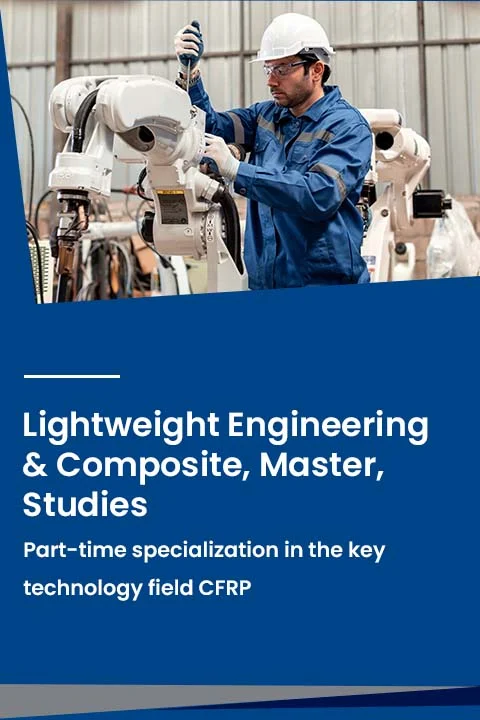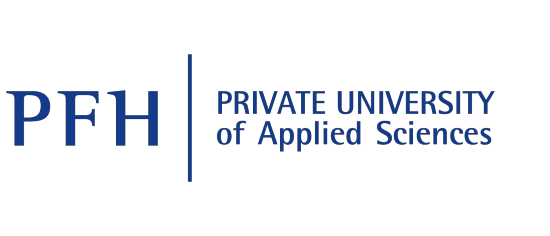

Masters of Lightweight Engineering & Composites

Specialize in lightweight construction
The Master’s degree in “Lightweight Engineering & Composites” is intended for engineers and graduates of mathematics and natural sciences with professional experience, who would like to gain a qualification in the area of composites via the professional development route. The particular focus of the study programme is on both carbon fibre-reinforced plastics (CFRP, colloquially known as “carbon”) and glass fibre-reinforced plastics (GFRP).
A Master’s qualification will open up the best possible career prospects, with the CFRP branch of the economy alone being forecast to grow by 10 percent a year. The high demand for specialists in composites is therefore bound to continue to increase in future.
Study Content
Part-Time Programme: You will complete a total of four block units, each of 16-days’ duration, and a weekend course. In addition, blended-learning units accompany the study programme. The study content of the four Lightweight Engineering & Composites blocks does not differ from those of the Triple-Award programme. The third semester is reserved for the Master’s thesis and oral defence. This split ensures that you can optimally coordinate your studies alongside your job.
Tripe-Award Programme: The heart of the MSc programme consists of four 16-day blocks of lectures and workshops/lab sessions, between which you take intensive German language and Management courses. The first two semesters are dedicated to theoretical consolidation of the engineering science content, focusing particularly on the conceptual and structural design of fibre composites, partially/fully automated manufacturing processes and process optimisation. You will also obtain extensive knowledge about designing multi-functional composites and implementing intelligent fibre composite structures. Business Administration content, such as Internal Accounting & Controlling (in the context of a business simulation game), and Innovation and Strategic Management, are also integrated into the first semester. Finally, in the third semester, you will work on your Master’s thesis.
Module 1: Business administration
Internal Accounting & Controlling, Strategic Management
Module 2: Deepening mathematical and scientific basics
Calculation Methods of Structural Mechanics, Material Mechanics and Material Behaviour
Module 3: Structural design of the composite materials
Damage Tolerant Structural Design, Nonlinear Structural Design Methods
Module 4: Partially automated and fully automated manufacturing processes
Assembly Logistics of Automated Manufacturing Processes, Quality Assurance Methods in Manufacturing and Service
Module 5: Sustained process optimisation
Industrial Production Technologies for Composite Structures, Digital Factory Planning, Deterministic Assessment of Production Processes
Module 6: Design of multifunctional composite structures
Design of Composite Structures, Hybrid Construction Methods, Adaptive Composite Structures
Module 7: Master Thesis and Disputation
Course Details
-
Degree : MS - 60 ECTS (Part-Time)
90 ECTS (Triple-Award) - Duration : 3 Semesters
- Location : Stade (Hamburg)
- Start Date : October 1st
- Tuition Fee : € 7200 / Semester
Why PFH?
- 100% Job Guarantee
- 500+ Partner Companies
- 50+ International Partner Universities
- English Taught
- Hassle-Free Admission
- Scholarship Available
Start 2025 with a Scholarship!
PFH has launched a scholarship scheme in Master’s programme for Indian students.
Apply now for a limited scholarship covering a minimum 20% of your fees!
University Partners
Collaborative partnerships with other universities enable joint research projects, support the permeability of available courses for students of the respective other university and pave the way for PFH graduates to undertake doctoral projects at the respective partner university.
Through international university partnerships, PFH creates the structures for student exchanges and academic qualifications in the respective countries.
Admission Process for MS in Germany at PFH
- Apply for Admission
- Fill out our online form to register for your program. We will email you the pre-filled contract for review.
- Gather the required documents which are given on the website.
- Submit the completed application form.
- Applicants will be contacted by our admissions team regarding the documents required for admission and recognition.
Requirements for MS in Germany at PFH
Degree in engineering or mathematical science with above-average marks and at least one year of field-related professional experience
Documents Required
- Curriculum vitae
- Higher education entrance qualification
- Copy of passport
- Digital photo
- Letter of motivation
- Employment references
- Letter of recommendation
- Statement of purpose
- Proof of language proficiency in German or English
Jobs after MS in Germany at PFH
The Master of Science in Lightweight Engineering & Composites will give you a cross-industry qualification enabling you to undertake management tasks in activities related to fiber composites. It will, for example, open up excellent career prospects in aircraft construction, automotive engineering, machine construction, ship and yacht building, railway vehicle and wind turbine construction.
- Fibre Composite Engineering / Lightweight Construction
- Aerospace Engineering
- Mechanical Engineering
- Product Development
- Entrepreneurship
MS in Germany Scholarship at PFH
The students can avail of scholarships in Germany to help them lower their expenses for pursuing the management program. Students from other countries are also allowed to do part-time jobs for 20 hours per week. With the benefit of practical experience in their field of interest, they also get international exposure. These jobs help them to earn while they study and lessen their financial burden. Many universities run various scholarships for MBA in Germany to help deserving students. The top scholarships that are awarded to the students are:
Global Study Award Scholarship- is given in association with study portals, ISIC, and British Council. The main motive behind this scholarship is to encourage students to study abroad, explore new countries, culture and learn a new language. The maximum amount of scholarship is GBP 10,000.
Central Sector Scheme of National Overseas Scholarship- it provides financial help to selected students aspiring to study MBA in Germany from reputed universities. It is awarded to 100 students with an amount of USD 33,800.
The Financial Sumo Educational Scholarship Program- helps students to lessen their financial burden on college students. This scholarship is awarded to only one student with a maximum amount of USD 1000.
Broker Fish International Student Scholarship- this is to aid international students to ease their financial costs during their stay in a foreign country. The maximum amount of this scholarship is USD 1000.
Go Clean Scholarship- to the students who are hard-working and dedicated. This merit-based scholarship requires the students to write an article on the topic “How to keep the environment green and clean” and helps the student with an amount of USD 3500.
Pursuing scholarships, such as the prestigious DAAD Scholarship, can significantly reduce your financial burdens. At PFH, we support you in your educational goals. You can choose from several scholarship options such as:
- Deutschlandstipendium/Germany Scholarship
- STIBET-Programme
- DAAD Prize
- Erasmus Scholarship Programmes
- Friedrich-Ebert Stiftung
- Heinrich Böll Foundation
- Konrad-Adenauer Stiftung
Completing your MS in Germany from PFH not only offers world-class education but also offers various visa benefits such as:
- PFH Graduates can explore career opportunities by availing the 18 month post-study work visa (PSW).
- PFH Graduates can also apply for job seeker visa
- Work visa for qualified professionals is issued for a maximum period of 4 years
- People who are non-EU nationals can receive the EU blue card
Questions - Always Welcome
Do you still have questions about your studies? We are by your side! Our consulting team can be reached under the following contact options.
Enquire Now
Our Industry Partners
PFH University Board of Trustees (13 world famous companies) and its more than 500 partner companies, the University has excellent links to business throughout Germany and, particularly in the regions of Göttingen and Stade, is embedded in a largely SME-oriented company environment.
Frequently Asked Questions
At PFH University, you can apply at any time.
- Application form via our website
- Curriculum vitae
- Higher education entrance qualification
- Copy of passport
- Digital photo
- Letter of motivation
- Employment references
- Letter of recommendation
Yes, you will need proof of advanced English language skills, e.g. Bachelor’s taught in English, TOEFL, IELTS, ESOL CAE or BEC Higher.
If you are a citizen of a country in the EU, EEA or Switzerland, you do not require a visa or other documentation to enter Germany and study here. However, once you arrive and find accommodation, you must register with the local residents’ registration office.
If you are coming from a country other than the ones named above, you will require a visa. For more information specific to your home country, please visit the Federal Foreign Office website.
At PFH University, we offer international students three types of scholarships:
- STIBET-Programmes
- DAAD Prize
- Deutschland Stipendium/Germany Scholarship
For more information on each of the scholarships, click here.
During your studies, you are generally allowed to do 120 full days or 240 half-days of paid work and take small student jobs. In exceptional circumstances, your local foreigners office may impose further restrictions.
International students coming to Germany have two options when it comes to accommodation: student halls of residence and private accommodation. For more information, you can visit the Accommodation Finder from the Federal Ministry of Education and Research or contact our international office.
When you compare Germany to other European countries, you’ll find that it’s not very expensive. The living costs are just slightly higher than the EU average, with rent being the largest expense. On average, students in Germany spend around 850 EUR per month (750 EUR in Göttingen for the management degree).







